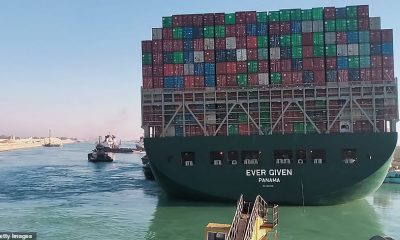Business
Suez Canal blockade: Fears mount over calamity worsening

A huge container ship blocking the Suez Canal like a “beached whale” may take weeks to free, the salvage company has said, as officials have stopped all ships entering the channel in a new setback for global trade.
But there are fears of rising piracy among others as efforts at dreading have been slow and tortuous and the calamity may get even worse.
Every day, there is another backlog; these ships are sitting there at risk, says the International Maritime Bureau.
The Suez Canal is an artificial sea-level waterway in Egypt, connecting the Mediterranean Sea to the Red Sea through the Isthmus of Suez and dividing Africa and Asia.
The Suez Canal handles about 10 per cent of international maritime trade and is one of the world’s busiest waterways, providing a crucial link for oil, natural gas and cargo shipping between the Atlantic Ocean and the Pacific Ocean.
The 400 metre EverGreen, almost as long as the Empire State Building is high, blocking transit in both directions through one of the world’s busiest shipping channels for oil and refined fuels, grain and other trade linking Asia and Europe.
Dredgers late on Thursday were still working to remove thousands of tonnes of sand from around the ship’s bow.
The Suez Canal Authority said earlier that nine tugs were working to move the vessel, which got stuck diagonally across the single-lane southern stretch of the canal on Tuesday morning amid high winds and a dust storm.
“We can’t exclude it might take weeks, depending on the situation,” Peter Berdowski, CEO of Dutch company Boskalis, one of two rescue teams trying to free the ship, told the Dutch television programme “Nieuwsuur”.
A total of 206 large container ships, tankers carrying oil and gas, and bulk vessels hauling grain have backed up at either end of the canal, according to tracking data, creating one of the worst shipping jams seen for years.
The blockage comes on top of the disruption to world trade already caused in the past year by COVID-19, with trade volumes hit by high rates of ship cancellations, shortages of containers and slower handling speeds at ports.
The world’s number one line AP Moller Maersk said it was considering diverting vessels around Africa’s Cape of Good Hope, adding five to six days to the journey between Asia and Europe.
It said time-sensitive cargo could be sent on trains and airplanes, although no decisions had yet been made.
The SCA, which had allowed some vessels to enter the canal in the hope the blockage could be cleared, said it had temporarily suspended all traffic on Thursday.
Maersk said in a customer advisory it had seven vessels affected.
Berdowski said the ship’s bow and stern had been lifted up against either side of the canal.
“It is like an enormous beached whale. It’s an enormous weight on the sand. We might have to work with a combination of reducing the weight by removing containers, oil and water from the ship, tug boats and dredging of sand.”
Dredging work to remove 15,000-20,000 cubic metres of sand surrounding the bow continued after dark on Thursday, in coordination with the team from Boskalis subsidiary Smit Salvage, the SCA said.
The dredging work, which began on Wednesday evening and has involved two dredgers, aims to return the ship to a draft of 12-16 metres at which it could be refloated, the authority said.
Japanese shipowner Shoei Kisen apologised for the incident and said work on freeing the ship, which was heading to Europe from China, “has been extremely difficult” and it was not clear when the vessel would float again.
Another official with knowledge of the operation said that was likely to take days. “If you end up in the scenario that you have to remove cargo then you are looking at a time consuming exercise,” he said, declining to be named.
A higher tide due on Sunday may help the rescue efforts.
However, the Egyptian meteorological authority is also warning of a “disruption of marine navigation” due to an expected sea storm on Saturday and Sunday, with winds forecast to reach up to 80 kph (50 mph) and waves up to 6 metres high along the Red Sea and the Gulf of Suez.
About 30 per cent of the world’s shipping container volume transits through the 193 km (120 mile) Suez Canal daily, and about 12 per cent of total global trade of all goods.
“Every port in Western Europe is going to feel this,” Leon Willems, a spokesman for Rotterdam Port, Europe’s largest, said. “We hope for both companies and consumers that it will be resolved soon.”
Consultancy Wood Mackenzie said the biggest impact was on container shipping, but there were also a total of 16 laden crude and product oil tankers due to sail through the canal and now delayed.
The tankers were carrying 870,000 tonnes of crude and 670,000 tonnes of clean oil products such as gasoline, naphtha and diesel, it said.
Russia and Saudi Arabia are the top two exporters of oil through the canal, while India and China are the main importers, oil analytics firm Vortexa said.
“The biggest fear of any vessel is remaining static. That’s going to start raising huge concerns for these shipping companies,” Joshua Hutchinson, general manager at ARX Mouldings said.
According to the International Maritime Bureau, politically motivated attacks on both sides of the Suez are a grave concern.
“Piracy is not an issue in that part of that world; terrorism is probably the biggest threat,” said Chris Long, intelligence director for Neptune P2P, a security consultancy focused on maritime safety.
Business
Nigeria Fuel Prices May Rise as Middle East Crisis Deepens

Nigeria Fuel Prices May Rise as Middle East Crisis Deepens
Growing Middle East tensions triggered by ongoing military actions involving the United States and Israel against Iran may soon lead to higher fuel prices in Nigeria, following a surge in global crude oil prices to $72.87 per barrel.
The escalation followed a coordinated strike across multiple locations in Iran, including Tehran, significantly heightening geopolitical instability and fuelling fears of supply disruptions in global oil markets.
For Nigeria—where crude oil accounts for over 85 percent of export earnings and nearly half of government revenue—the implications are far-reaching. While higher oil prices could boost government income, analysts warn that Nigerians may soon face increased petrol (PMS) prices, especially in the current post-subsidy era.
Energy experts say the oil price surge presents a mixed outlook. Oil and gas analyst Ayodele Oni explained that while Nigeria could benefit from increased foreign exchange inflows, higher crude prices typically lead to higher landing costs for petrol, which are eventually passed on to consumers.
Similarly, energy expert Kelvin Emmanuel noted that Nigeria’s 2026 budget benchmark of $64.85 per barrel means the government stands to earn more revenue from rising oil prices. However, he warned that refineries will be forced to adjust fuel prices in line with market realities.
This includes domestic refiners such as the Dangote Refinery, which operates in a deregulated downstream environment where petrol prices are tied to crude oil costs, exchange rates, and operational expenses.
READ ALSO:
- ICPC Says It Found Wiretapping Devices in El-Rufai’s Abuja Residence
- Lagos Announces Traffic Diversions for Ogunnusi Road Reconstruction in Ikeja
- Global Crude Hits $73 as Middle East Tensions Escalate
Economic analyst Dr. Muda Yusuf, Chief Executive Officer of the Centre for the Promotion of Private Enterprise (CPPE), said geopolitical conflicts in the Middle East often trigger oil price spikes due to fears of supply disruptions—particularly around key shipping routes such as the Strait of Hormuz.
According to Yusuf, Nigeria could benefit from:
- Higher crude export earnings
- Improved foreign exchange inflows
- Stronger external reserves
- Increased FAAC allocations
However, he cautioned that Nigeria’s current oil production level of about 1.4–1.6 million barrels per day remains below capacity and is constrained by oil theft, pipeline vandalism, underinvestment, and infrastructure challenges. Without resolving these issues, the country may fail to fully capitalise on higher oil prices.
Yusuf also warned of inflationary pressures, noting that rising fuel costs could increase transport fares, food prices, manufacturing costs, and logistics expenses, worsening the cost-of-living crisis for Nigerian households.
Offering a more cautious outlook, energy economist Professor Wumi Iledare said the current oil rally may be temporary, explaining that modern oil markets operate on real-time data and rational expectations. He noted that unless the Middle East crisis leads to a sustained disruption in oil supply, prices may stabilise.
Energy law expert Professor Dayo Ayoade echoed this view, stating that many countries maintain strategic crude oil reserves, which could limit extreme price spikes. He added that even if prices approach $80 per barrel, Nigeria must remain cautious due to its debt obligations and oil-backed loans.
Ademola Henry Adigun, Chief Executive Officer of AHA Consultancies, said the crisis could further destabilise global energy markets, simultaneously boosting government revenue while raising petroleum product prices domestically.
Analysts stressed that to maximise potential benefits and minimise economic pain, Nigeria must:
- Strengthen anti-oil theft and pipeline protection measures
- Boost upstream oil production and investment
- Expand domestic refining capacity
- Save excess oil revenue during price surges
- Protect vulnerable households from inflation shocks
- Accelerate economic diversification beyond oil
Ultimately, experts describe the deepening Middle East crisis as a double-edged sword for Nigeria—offering short-term fiscal gains while posing serious risks of fuel price hikes, inflation, and economic hardship if not carefully managed.
Nigeria Fuel Prices May Rise as Middle East Crisis Deepens
Business
Global Crude Hits $73 as Middle East Tensions Escalate
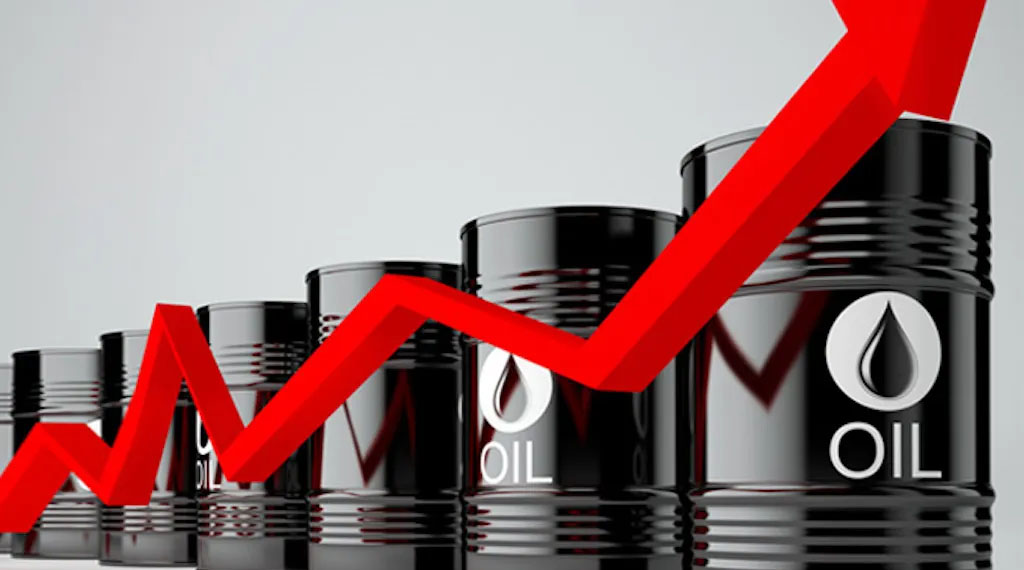
Global Crude Hits $73 as Middle East Tensions Escalate
Global oil prices jumped to around $73 per barrel following fresh U.S. military strikes on Iran, heightening fears of supply disruptions in the Middle East and sparking volatility in global energy markets. The increase reflects growing geopolitical risks in a region that accounts for a significant portion of the world’s crude exports.
The surge affected major crude benchmarks. Nigeria’s Bonny Light crude rose to about $72.90 per barrel from $70.80, while Brent crude increased to $72.87 per barrel from $71.10. Murban crude, widely used as a benchmark for Middle East oil, climbed to $74.24 per barrel from $71.50, highlighting market sensitivity to regional tensions.
Geopolitical Concerns Drive Price Spike
Analysts attributed the surge to fears that ongoing conflict could affect production facilities, export terminals, and key maritime routes such as the Strait of Hormuz, a crucial corridor for global oil shipments. The potential for disruption in these areas has intensified market anxiety, pushing prices higher.
READ ALSO:
- Four Die in Katsina Stampede During Ramadan Alms Distribution
- ISWAP Fighter’s Female Relative Surrenders to Troops in Borno
- Gunmen Abduct Father of Former Ebonyi Deputy Governor on Way to Church
OPEC+ Announces Gradual Return of Production
Amid rising prices, OPEC+ members reaffirmed their commitment to stabilizing markets. In a virtual meeting on March 1, 2026, eight countries — Saudi Arabia, Russia, Iraq, United Arab Emirates, Kuwait, Kazakhstan, Algeria, and Oman — reviewed market conditions and announced a plan to gradually return 1.65 million barrels per day (bpd) of voluntary production cuts previously implemented in 2023.
Under the latest agreement, 206,000 bpd will be added back to the market in April 2026, with the remainder phased in gradually based on evolving market conditions. The alliance emphasized continued monitoring of market fundamentals, including global demand, oil inventories, and geopolitical developments, to ensure a balanced and stable market.
The countries also reiterated compliance with the Declaration of Cooperation, ensuring any excess production would be accounted for and corrected through future adjustments. Monthly meetings will continue to assess market trends, with the next session scheduled for April 5, 2026.
Market Outlook and Analyst Predictions
Analysts warned that the combination of geopolitical tensions and the gradual return of OPEC+ supply could result in volatile crude prices in the coming weeks. Traders are balancing potential risks to supply against incremental increases in production, creating uncertainty in both crude and refined fuel markets.
Some experts indicated that if the conflict escalates or disrupts key oil transit points, prices could surge further, potentially exceeding $75 per barrel in the short term. The recent uptick has already sparked expectations of higher gasoline prices at the pump in major consumer markets.
The energy market continues to closely monitor developments in the Middle East, OPEC+ output decisions, and global demand patterns as key indicators for near-term price movements.
Global Crude Hits $73 as Middle East Tensions Escalate
Auto
Ex-CIG Motors GM Jubril of Lagos floats Hybrid Motors Nigeria

Ex-CIG Motors GM Jubril of Lagos floats Hybrid Motors Nigeria

A former General Manager of CIG Motors, Jubril Arogundade, popularly known as “Jubril of Lagos,” has unveiled a new automotive venture, Hybrid Motors Nigeria, with a bold ambition to reshape access to hybrid, compressed natural gas (CNG), and electric vehicles across the country.
Arogundade announced the launch on his birthday, Saturday, February 28, describing the company as a response to Nigeria’s growing appetite for cleaner and more flexible mobility options. He said Hybrid Motors Nigeria aims to build “a unicorn brand in the automobile industry” within five years by bridging gaps in vehicle availability, service capacity, and supporting infrastructure.
According to him, the company’s strategy will rest on seven core pillars: local assembly of hybrid and electric vehicles; nationwide distribution of petrol, hybrid and EV models; establishment of aftersales service and training centres; spare parts supply and distribution; deployment of EV charging systems and stations with what he described as “energy intelligence”; auto asset financing; and vehicle leasing services.
He disclosed that the company’s physical rollout would be phased, with an official showroom scheduled to open in June, while plans are underway to commence factory operations next year. Although he alluded to strategic partnerships that would accelerate market entry and industry transformation, he did not name the partners.
The launch comes at a time when hybrid and alternative-fuel vehicles are attracting increasing interest in Nigeria, driven by rising fuel costs, demand for lower operating expenses, and a broader shift towards cleaner transportation. Fleet operators and private motorists alike are exploring options that offer fuel flexibility and more predictable maintenance.
Hybrid Motors Nigeria said its model goes beyond vehicle sales, combining product supply with service readiness through technical training, parts availability, and charging infrastructure to prevent post-purchase support gaps that often slow adoption.
Further details on the company’s initial vehicle lineup, partnership framework, and rollout timeline are expected ahead of the showroom inauguration.
Arogundade’s announcement follows his recent exit from CIG Motors.
While the company’s Chairman, Diana Chen, had announced the termination of his appointment after an investigation reportedly indicated alleged financial misappropriation and abuse of office, Arogundade has maintained that he voluntarily resigned on December 2, 2025, in line with his contractual and internal corporate obligations.
-

 International2 days ago
International2 days agoAyatollah Ali Khamenei, Iran’s Supreme Leader, Dies After U.S.–Israeli Strikes
-
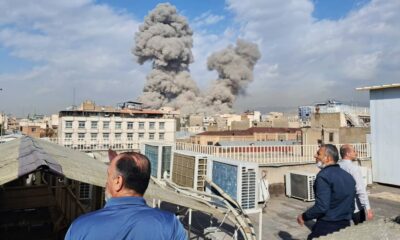
 International2 days ago
International2 days agoIran: US, Israel launch another strikes, Commander, Defence leader, five other top officials killed
-

 International3 days ago
International3 days agoMiddle East on Edge as Iran Retaliates Against Israel, U.S Bases
-

 International3 days ago
International3 days agoTrump Urges Iranians to Overthrow Government Amid US-Israeli Attacks
-

 International2 days ago
International2 days agoKamala Harris Slams Trump for Dragging U.S. Into ‘Unwanted War’ in Iran Conflict
-
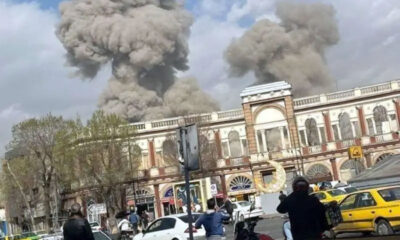
 International3 days ago
International3 days agoReports: US Forces Join Israeli Offensive Against Iran
-

 metro2 days ago
metro2 days agoHajj, Umrah Are for Muslims Only – Scholar Urges NAHCON to Tighten Screening
-
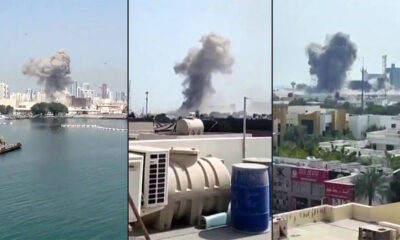
 International1 day ago
International1 day agoIran Retaliates: Gulf States Allied With US Hit by Missiles, Drones



